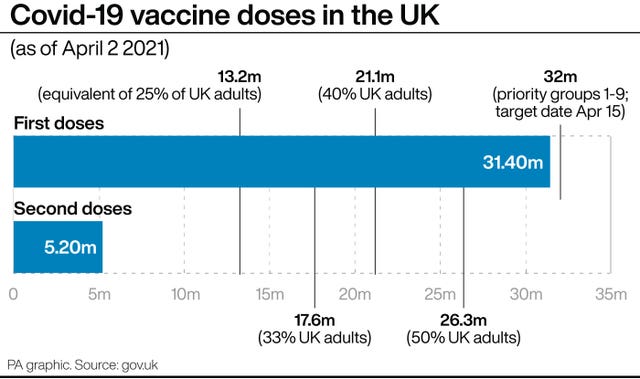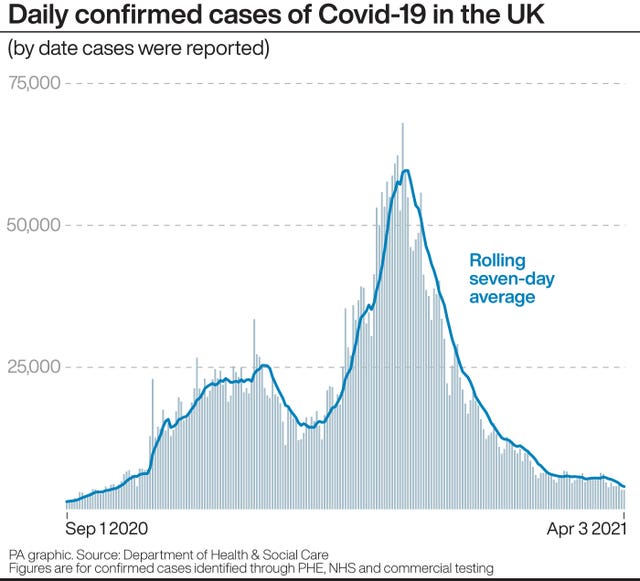Johnson hails ‘milestone’ as second doses of Covid jab pass five million
Experts said the controversy over the AstraZeneca vaccine has not affected take-up in the UK.

Boris Johnson has hailed another milestone in the coronavirus vaccine rollout as the number of people receiving their second jab passed the five-million mark.
Experts said the controversy over the AstraZeneca vaccine did not appear to be affecting take-up in the UK, despite signs of widespread hesitancy in Europe.
One leading scientist in the field said the evidence was increasingly pointing towards a causal link between the AstraZeneca jab and a number of rare blood clotting events.
However, regulators said the risks of taking the vaccine were still far outweighed by the risks of not doing so.
The latest Government data up to April 2 showed that 5.2 million people have now received a second dose with 31.4 million having had their first shot.
Mr Johnson said: “We’ve reached another milestone in our vaccination programme with over five million people now having had their second jab.
“I urge everyone to take up their second dose as soon as they are offered it.”
Professor Linda Bauld, of Edinburgh University, said all studies indicated the jab was safe and effective, while the fact different countries were reviewing their position was a sign that the system was working.
“It doesn’t look from the behavioural response, the surveys I’ve seen, that it’s affecting uptake in the UK and that’s really important,” she told BBC’s Good Morning Scotland radio programme
On Friday, the Medicines and Healthcare products Regulatory Agency (MHRA) said it had identified 30 cases of rare blood clot events – with seven deaths – out of 18.1 million doses of the AstraZeneca jab administered up to and including March 24.

They included 22 reports of cerebral venous sinus thrombosis (CVST) – which stops blood draining from the brain properly – and eight of other thrombosis events with low platelets.
The disclosure came as the Netherlands followed Germany in becoming the latest country to suspend the AstraZeneca vaccine for people aged under 60 due to fears of a link with rare blood clots.
Professor Paul Hunter, a medical microbiologist at the University of East Anglia, said the appearance of “clusters” of rare clots among people who had had the AstraZenca jab in different countries increasingly suggested it was not a “random association”.
“It is not uncommon to get clusters of rare events purely by chance,” he told the BBC Radio 4 Today programme.
“But once you find that cluster in one population and it then crops up in another – such as previously in the German and now in the English – then I think the chances of that being a random association is very, very low.
“Clearly more work needs to be done, but I think the evidence is shifting more towards it being causally related at the moment.”
However, he said the risks associated with the AstraZeneca vaccine were still very low compared to the risks of not getting the jab.
“The chance of dying if you don’t have the vaccine is many times greater than the risk of dying from CVT after the AstraZeneca vaccine, even if it does turn out, as I suspect it will, that this link is causal,” he said.
Meanwhile, the Government has announced that care home residents will be allowed a second regular indoor visitor from April 12, while babies and young children will also be able to attend.
Infants and children will not be counted as one of the two visitors, meaning care home residents in England will be allowed to see small bubbles of loved ones for the first time in months.

The Department of Health and Social Care (DHSC) said the drop in community infection and vaccine rollout meant the increase in visitor numbers could go ahead as set out in the road map out of lockdown.
The move comes amid reports that people who have had the jab could be able to travel abroad and avoid quarantine restrictions under plans to allow foreign summer holidays.
Mr Johnson is expected to signal on Monday that foreign getaway destinations will be ranked under a traffic light system when international travel restrictions ease.





